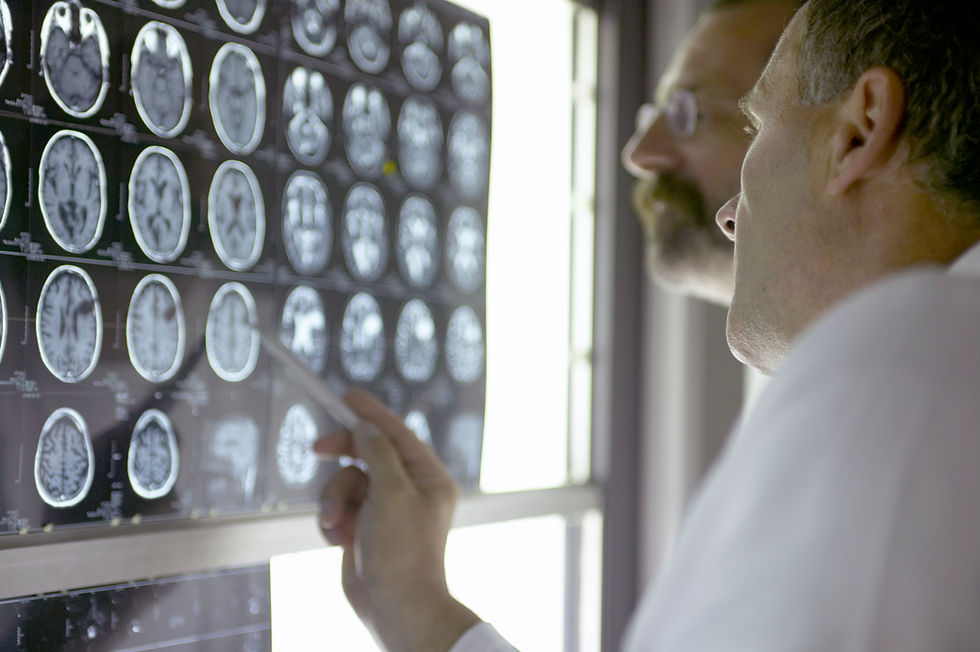Types of Dementia
- ukhomecare2011
- Jul 3, 2013
- 3 min read

Dementia symptoms vary by individual, however for the condition to be considered dementia, then at least 2 of the core mental functions (shown below) should be considerably impaired: memory, communication and language, ability to focus, reasoning and judgment and visual perception. Dementia is caused due to damage to the brain cells, and the reasons for the damage can vary greatly. For example, Alzheimer’s disease is caused by high levels of certain proteins inside and outside of the healthy brain cells. But other dementia forms have other causes and so affect and impair different areas of the brain. For more information on Dementia Diagnosis please click on: http://www.nhs.uk/Conditions/dementia-guide/Pages/dementia-diagnosis.aspx For more information on Dementia Diagnosis please click on: http://www.alzheimers.org.uk/site/scripts/documents.php?categoryID=200346 The most common form of dementia other than Alzheimer’s is Vascular Dementia, which apparently accounts for upto 20-30% of cases and is widely believed to be under-diagnosed. Vascular Dementia is also known as Vascular Cognitive Impairment, Vascular Dementia is caused by blocked or reduced blood flow to the brain. Therefore, with Vascular Dementia, impaired judgment and the inability to plan is more likely to be the initial symptom rather than memory loss. For more information on Vascular Dementia please click on: http://www.nhs.uk/Conditions/vascular-dementia/Pages/Introduction.aspx For more information on Vascular Dementia please click on: http://www.alzheimers.org.uk/site/scripts/documents_info.php?documentID=161 The 3 rd most common form (according to my reading) of dementia after Alzheimer’s & Vascular Dementia is thought to be Dementia with Lewy bodies (DLB), which accounts for approximately 10-25% of cases other than Alzheimer’s. Those who suffer with Dementia with Lewy bodies often experience the memory loss and have thinking problems just the same as Alzheimer’s patients do. However, people who suffer with Dementia with Lewy bodies are more likely to have early symptoms such as sleep disturbances, visual hallucinations and muscle rigidity or other Parkinson’s like movement features. The diagnosis for Dementia with Lewy bodies is clinical in nature, which means that it relies on a medical professional’s judgment. A Dementia with Lewy bodies diagnosis can be made when dementia symptoms consistent with DLB develop prior to movement symptoms, when both dementia symptoms and movement symptoms are present or when dementia symptoms develop within a year of movement symptoms. For more information on Dementia with Lewy bodies please click on: http://www.alzheimersresearchuk.org/dementia-information/?gclid=CN6hkaDnkLgCFYXMtAodmkgALA For more information on Dementia with Lewy bodies please click on: http://www.alzheimers.org.uk/site/scripts/documents_info.php?documentID=113 Parkinson’s disease is a disorder of the brain that leads to shaking and difficulty with walking, movement and coordination. As Parkinson’s disease progresses, it often results in a dementia form similar to Lewy bodies & Alzheimer’s. The mental functions are affected, including the memory and the ability to pay attention, make judgments or when planning something. It’s not uncommon to have more than 1 cause for dementia. Mixed dementia or “Dementia - multi-factorial” is a condition in which abnormalities of more than 1 form of dementia occur at the same time. The most common forms often include Alzheimer’s with Vascular Dementia, Dementia with Lewy bodies, or sometimes brain changes that are associated with all 3. Frontotemporal dementia (FTD) is a term capturing a number of dementias, including behavioral variant FTD, primary progressive aphasia, Pick’s disease and progressive supranuclear palsy. Symptoms such as changes in behavior and difficulty with language often occur at a younger age, typically around 60. Patients generally survive for shorter periods of time than those with Alzheimer’s. For more information on Frontotemporal dementia please click on: http://www.nhs.uk/Conditions/frontotemporal-dementia/Pages/Introduction.aspx For more information on Frontotemporal dementia please click on: http://www.alzheimers.org.uk/site/scripts/documents_info.php?documentID=167 People sadly can suffer from various rare, fatal brain disorders. The most common is called Creutzfeldt-Jakob disease (CJD). This is a rapidly fatal disorder that impairs memory and coordination. Memory issues are usually severe whilst other thinking and social skills seem unaffected by Wernicke-Korsakoff Syndrome, a chronic memory disorder caused by a thiamine (vitamin B-1) deficiency. The most common cause of Wernicke-Korsakoff Syndrome is alcohol misuse.












































Comments